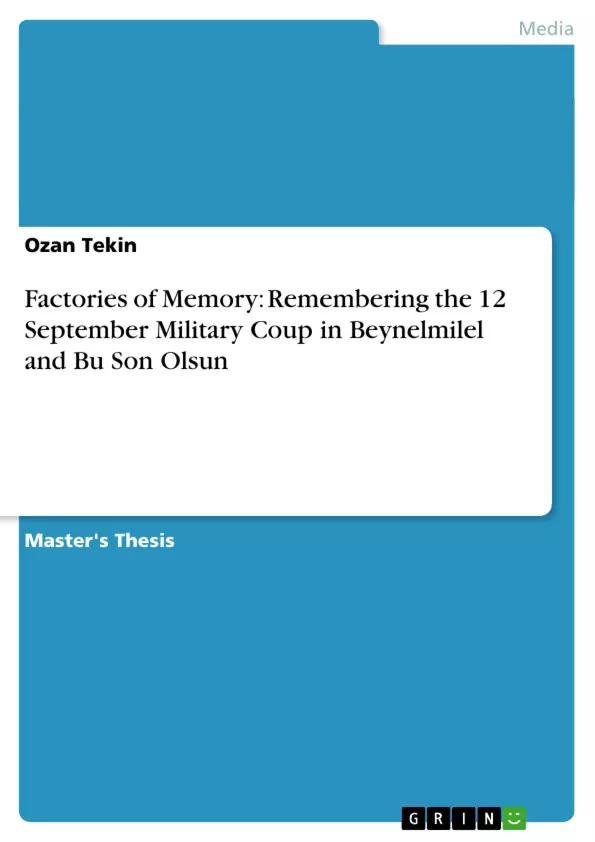12 September 1980, the third successful military coup in the history of Turkey, has had a debilitating impact on the social, political and cultural life of the country. This thesis examines the representations of the 12 September coup through the lens of film as memory. Based on content analysis of two films, Beynelmilel (2006) and Bu Son Olsun (2012) and their reception, this study examines the representations of the 12 September military coup by means of the concepts of cultural memory, communicative and material memory (memory of objects), and construes whether the reconstruction of this particular past event is challenged by the abovementioned cinematic products as a way to impinge upon the collective memories of this seminal event in Turkey. The results demonstrate that both cinematic products are reflective of multiple and fragmented memories of the 12 September, and that there is not a strong manifestation of remembering or references to memories of this event as the interpretation of online reviews of both products puts forward.
Inhaltsverzeichnis (Table of Contents)
- Introduction
- Aim
- Research Questions
- Structure
- Motivation
- Material
- A Brief Historical Background
- Chapter One: Theoretical Background
- What is Memory?
- Individual vs Collective Memory
- Cultural Memory
- History vs Memory: The Past Present and the Present Past
- Film, History and Memory
- Chapter Two: Methodology
- Rationale for Selection of Cases
- Method
- Limitations and Criticism
- Chapter Three: Analysis
- A Rural Perspective: Beynelmilel
- Synopsis of film
- Beynelmilel as a 12 September Film
- Silence and Peace: How Does Beynelmilel Construct Memory?
- Communicative Memory
- Memory of Objects
- Seeing Reality On the Ground: Comparison of My Readings to The Reviews
- WILL IT BE THE LAST?: SILENCING SOCIETY IN BU SON OLSUN
- Synopsis of film
- Bu Son Olsun as a 12 September Film
- Communicative Memory
- Memory of Objects
- Reality On the Ground Two: Comparison of My Readings To the Reviews
Zielsetzung und Themenschwerpunkte (Objectives and Key Themes)
This thesis examines the representations of the 12 September 1980 coup in Turkey through the lens of film as memory, focusing on the films "Beynelmilel" (2006) and "Bu Son Olsun" (2012) and their reception. The study analyzes the representations of the coup using concepts of cultural memory, communicative memory, and material memory (memory of objects) to investigate whether these cinematic products challenge the collective memory of this pivotal event in Turkish history.- The impact of the 12 September 1980 military coup on Turkish society, culture, and politics
- The role of film as a medium for representing and transmitting collective memory
- The relationship between cinematic representations and the construction of cultural memory
- The analysis of communicative and material memory (memory of objects) in relation to the 12 September coup
- The impact of cinematic products on the collective memory of the 12 September coup
Zusammenfassung der Kapitel (Chapter Summaries)
- The introduction establishes the research focus and provides a brief historical background of the 12 September 1980 coup in Turkey. It highlights the significance of the event and the subsequent impact on society.
- Chapter one delves into the theoretical framework of the study, exploring various concepts of memory, including individual and collective memory, cultural memory, and the relationship between history and memory. The chapter also discusses the role of film in representing history and memory.
- Chapter two outlines the methodology employed in the study, including the rationale for selecting "Beynelmilel" and "Bu Son Olsun" as case studies. It also discusses the method of analysis and the limitations of the research.
- Chapter three focuses on the analysis of the films, starting with "Beynelmilel" and its depiction of the 12 September coup from a rural perspective. The chapter examines the film's use of silence and peace to construct memory, and explores the concepts of communicative memory and memory of objects. It concludes with a comparison of the author's interpretations with online reviews of the film.
- This chapter also analyzes "Bu Son Olsun" and its portrayal of the 12 September coup's impact on society. The analysis focuses on the film's portrayal of silencing and its use of communicative memory and memory of objects. The chapter concludes with a comparison of the author's interpretations with online reviews of the film.
Schlüsselwörter (Keywords)
The key themes of the thesis revolve around the 12 September 1980 military coup in Turkey, its impact on society and culture, and the role of film in representing and transmitting collective memory. The study employs concepts of cultural memory, communicative memory, and material memory (memory of objects) to analyze the cinematic representations of the coup and its impact on collective memory. Keywords include: 12 September, collective memory, cultural memory, memory studies, film studies, reception studies, and history.Frequently Asked Questions
How did the 12 September 1980 coup affect Turkish society?
The third successful military coup in Turkey had a debilitating impact on the social, political, and cultural life, leading to long-term silencing and fragmentation of memory.
What is 'film as memory' in the context of Turkish history?
It refers to the use of cinema to represent, reconstruct, and challenge collective memories of historical events like the 1980 military coup.
What is the difference between communicative and material memory?
Communicative memory is based on everyday interaction and oral history, while material memory (memory of objects) focuses on how physical items carry historical meaning.
Which films are central to the study of coup representations?
The films 'Beynelmilel' (2006) and 'Bu Son Olsun' (2012) are key examples that offer rural and societal perspectives on the coup's aftermath.
Do cinematic products effectively change collective memory?
While films reflect multiple memories, research shows they don't always create a strong, unified manifestation of remembering among the general public.
- Quote paper
- Ozan Tekin (Author), 2012, Factories of Memory: Remembering the 12 September Military Coup in Beynelmilel and Bu Son Olsun, Munich, GRIN Verlag, https://www.grin.com/document/202613



